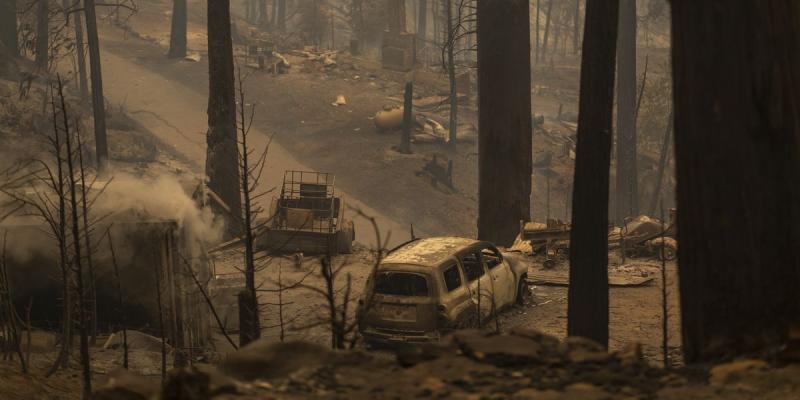What's causing climate change, in 10 charts
By: David Roberts (Vox)
The blame game is a favorite pastime for environmentalism. Is this science? Is this politics? Is this sensationalism? Is this simply believing what we want to believe?
The logical flaws are apparent. The thinly disguised manipulation is obvious. The nonspecific solutions are overly idealistic emotionalism. And at the end of the story the motivation for the blame game is revealed as nothing more than greed.

With heat waves, wildfires, intense hurricanes, and other extreme weather events in the headlines, the ravages of climate change have become undeniable and unavoidable. Who or what is responsible for this?
It seems like a simple enough question, but like so many things about climate change, it gets more complicated the more you look into it. It turns out there are a number of ways of divvying up the blame.
To illustrate the point, I've borrowed some charts from a recent research note by the investment firm Morgan Stanley (with permission). They help distinguish who is emitting in the present from who emitted in the past, who's emitting more and less over time, and which fuels and activities are driving the change.
None of this data is original — it's all public — but putting these charts in one place can help us wrap our minds around the many different ways that questions about responsibility for climate change can be phrased.
What question do we ask when we ask who's to blame for climate change?
If the question is which country currently emits the most greenhouse gas emissions, the answer is China.
If the question is which country's people emit the most greenhouse gases on a per-capita basis, the answer is Americans, by a fairly wide margin. (Canada and Australia also have high per-capita emissions, as do a few Middle Eastern countries, not on this chart.)
If the question is which region or country is responsible for the biggest portion of the greenhouse gases already in the atmosphere, for a long time, the answer was Europe and today it still is (with Russia and the rest of Eastern Europe included), with North America and Asia tied for second, according to Our World in Data.
If the question is which individual country is responsible for the most emissions, it's the US, at almost double its nearest competitor, China.
If the question is which country or region is heading fastest in the right direction, the answer is Europe. (Look at China — is that a peak or a pause?)
If the question is which fuel has contributed most to climate change, the answer, as of the 21st century, is coal, followed by oil and natural gas.
If the question is which economic sector contributes the most greenhouse gases, the answer is electricity and heat. This chart from Our World in Data makes it even clearer that, globally, the rising demand for electricity and heating is the main driver of emissions, with transport rising at a distant second.
(Note that in the US, the situation is somewhat different — transportation emissions are rising and electricity sector emissions are falling. The lines recently crossed.)
The story told by the data
The story told by these charts is familiar to people who have followed climate change for a while. Fossil-fueled industrial development came to the EU, then it came to North America, and just as it was getting underway in China, the world found out that, oops, this development is going to destabilize the atmosphere and potentially devastate the biosphere. And what's more, the amount of greenhouse gases already in the atmosphere means that humanity's remaining carbon budget is perilously low. The model of development with a proven record of success has been revealed as extremely dangerous if it continues as it has in the past.
That's a raw deal for China, as well as India, Vietnam, and other countries trying to raise their citizens to the level of affluence and comfort afforded those in the West. At the same time, it is mostly emerging economies that face the greatest risks from climate change, so they simply must change course, at their own peril.
In this mess of a situation, the answer to the question of responsibility for climate change is always yes, and. Yes, North America and the EU ought to acknowledge their historical responsibility for emissions. They ate up most of the carbon budget, developing in a way that is now off limits to the world's billions of poor people. In exchange for this good fortune, they have an obligation to help the emerging economies of the world shift to sustainable development and increase their resilience to the climate damages.
And China, India, and other developing nations have a responsibility to see that, for better or worse, they are in the climate driver's seat in the coming century and that every bit of fossil-fueled development bakes in more suffering later in the century.
North America and the EU owe the world some room (and some help) to raise their standard of living; the rest of the world owes it to itself to try to decouple welfare from material consumption and waste.
In the end, the conversation about responsibility leads where all climate conversations lead: The only hope of avoiding catastrophic damage is most every country decarbonizing as rapidly as they are capable, regardless of their histories and rivalries.
Electricity must be rapidly decarbonized to get rid of coal; heating and transportation must be rapidly electrified to get rid of oil and natural gas. Wealthy countries should mobilize to drive down the costs of clean-energy technologies through research and large-scale deployment; developing nations should work as hard as possible to substitute clean technologies when long-term industrial policy and infrastructure decisions are being made. And those with resources should help those with fewer prepare for the turbulent century to come.
Whoever's fault it is, we either all chip in to solve it or we all suffer.





After all the blaming and after all the idealism, we are still required to believe whatever we want to believe.
Why get rid of natural gas? It’s the driving force behind the USA meeting carbon footprint reduction goals from deals we never signed on to or got out of like Kyoto and Paris. Natural gas and the ultra clean coal which at least Indonesia and the USA have and it burns as cleanly as natural gas will be with us a long time of we are to have a fully functioning modern society. Until we overcome the phobias of some toward nuclear power, we will have to rely on technology to make the use of oil and regular coal cleaner and less impactful.
Why not get rid of natural gas?
Whether or not to get rid of natural gas requires a choice. The competing arguments are about influencing that choice. Every choice has consequences. Blaming the choice for the consequences isn't difficult; any choice will have consequences. Making a different choice will not avoid the consequences of that choice.
Is that science? Is that politics? Is that sensationalism? Is that simply believing what we want to believe?
Natural gas is one of the cleanest burning fuels there is. Solar and wind power have their own environmental issues in both building them in the first place and in their actual use on a society running scale.
Throwing crap against the wall to rationalize a choice doesn't avoid responsibility for the consequences of the choices we make.
Comparing the consequences of choices we've made to the promises of choices we haven't made won't avoid responsibility for either choice.
We are all to blame no matter what we choose. That's what makes the blame game so easy to play.
The negative environmental impacts of solar and wind power are far less than the negative environmental impacts of burning fossil fuels.
Anthropogenic global warming is caused by increasing greenhouse gasses in the atmosphere as well as the anthropogenic decrease in carbon sinks.
That isn't clear. Comparing the consequences of fossil fuel use to the promises of solar and wind use doesn't really address the overall consequences of choosing one or the other. The consequences of choosing alternatives may cause different environmental problems or may not be environmental at all.
Carbon dioxide is not the only greenhouse gas being emitted. There are a number of gases emitted by human activities that have global warming potentials thousands of times larger than carbon dioxide.
As an example, emitting 1 ton of sulfur hexafluoride is the equivalent of emitting over 16,000 tons of carbon dioxide. Fluorinated gases are very potent greenhouse gases. Fluorine is used in the manufacture of solar panels and fluorinated gas emissions will contribute to climate change. Fluorinated gases also persist in the environment far longer than carbon dioxide.
You would hope that it's not about blame, but rather about seeing the most efficient path to protecting our environment.
Unfortunately, the best we can do is look at what we have done already. Emerging technologies of energy production turn out to have their own problems. For example, electric cars obviously emit less greenhouse gases than gas-burners, but they also need to have exotic metals to build them. This requires mining and - later - disposal that are destructive to the environment. Sometimes there is an argument that the cure can be worse than the problem.
The scientists aren't attempting to avoid blame (at least not to any significant extent). Scientists explaining the uncertainty in the science is a way to avoid blame but that isn't particularly significant overall. Society has placed an expectation upon science to provide a definitive answer that does not require making a choice. Science says we do this; no choice is required.
Unfortunately there isn't any definitive answer. A choice must be made. And that choice will have consequences.
Politicians are attempting to declare that the best guess made by science is definite. There isn't any choice. So, politicians can't be blamed for the consequences of doing anything different because making a change wasn't a choice.
The underlying cause is overpopulation